Six Nations 2013: Inside the minds of the England coaches
- Published
- comments
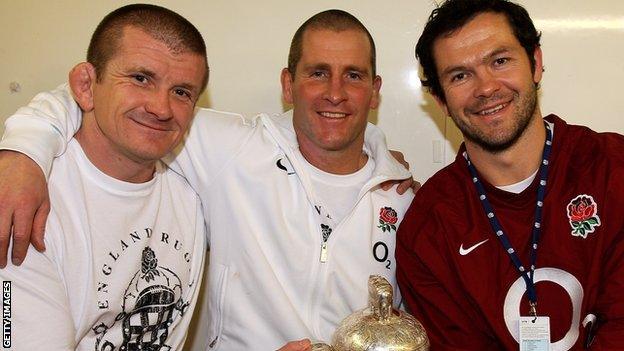
They're the coaching team who have rebuilt England from post-World Cup disarray into the most impressive outfit in this Six Nations season so far.
How have Stuart Lancaster and his lieutenants Andy Farrell, Graham Rowntree and Mike Catt achieved such a startling transformation?
How do they run this England team under the immense duress of match days, what are their secret strategies, and what emotions, fears and frustrations do they experience as these huge games unfold?
With admirable candour and insight, the four men - for the first time - take us inside that closely-guarded world.
Match-day morning
At the England squad hotel in rural Surrey, players and coaches make final preparations before boarding the team coach to Twickenham. With just a few hours until kick-off, nerves are tightening.
Six Nations: England 38-18 Scotland highlights
Stuart Lancaster, head coach (SL): "I've been coaching teams and dealing with the stress of it for 13 years now, but the pressure and intensity and scrutiny increase with England. Ideally you want to feel relaxed but ready for the game - not overly stressed or nervous, because then you can't be accurate with your decisions.
"It's more intense as a player, but then you also have the physical release of the actual match. Not as a coach. I was so frustrated after the South Africa defeat, and there was so much pent-up emotion, that I went out at 10pm and ran around the streets by our hotel for mile after mile."
Graham Rowntree, forwards coach (GR): "I will sit down with all the forwards in the hotel before we leave for the ground, and just ask each player for a couple of responsibilities they're going to perform well for us.
"I was very conscious as a player that certain coaches would come to me before kick-off with a clipboard, my name circled and boxes next to it to be ticked. For whose benefit was that?"
Kick-off minus 90 minutes
Deep inside the stadium, in the home dressing-room, each coach gets to work.
GR: "The referee comes in an hour before kick-off, and talks to the front row about how he's going to referee the scrum. We'll then discuss that, and we'll go into the ref's likely interpretation - 'he'll do this, he'll do that.' And then I will leave them to it.
"It's a massive temptation for a coach to get over-involved. You want everything to be perfect. But the lads have had me giving messages to them all week. They get it."
Andy Farrell, defence coach (AF): "Your pre-match talk to the players has to be simple. If it's too detailed, you'll lose them straight away, because those lads are concentrating on controlling their anxiety, and on their individual needs. There's a hell of a lot going through their minds.
"You trigger the right information, on the main points you've worked on all week. Intent is a massive part of the game - wanting to make a difference. So I might say to our nine or 10: 'Intent'. And then, 'is this clear?' 'Yes Faz'. 'Right - let's go'."
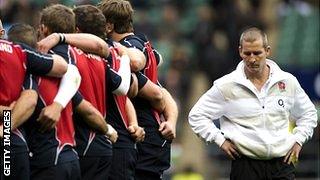
Lancaster is happy to give his team space in the build-up to Test matches
SL: "The hardest time for me is the bit between arriving at the stadium and going out for the warm-up. It's an hour. How do you fill it?
"There's nothing more unnerving for a player than to see your coach acting stressed. Players have their own routines, and so while you have time with them, equally you have to leave them to their own devices.
"When I was director of rugby at Leeds, I used to take myself away to an empty hospitality box and read a book. With England, there are no empty boxes. And you can't go for a chat with someone because there are too many people who want a piece of your time. You just have to sit there and watch the clock tick over."
Kick-off minus 20 minutes
Eighty thousand fans are piling into the stadium, excitement rising. Out on the pitch, Rowntree and Farrell are trying to damp it right down.
GR: "In the warm-up we simply get the body moving. There won't be a lot of technical input from me then because it's too late. They're in the zone. The more I start chucking in my chat, the more it will upset their thinking.
"I don't need to ramp them up. The crowd and the anthem take care of the adrenaline rush. Your heart will be going mad."
The game begins
With a roar from the crowd, the two sets of players pile into the first collisions. Up in the stands, Farrell, Rowntree and Lancaster watch on in a very different way.
AF: "You are analysing the action as it happens, and then trying to give the players accurate enough information that they can use to their advantage.
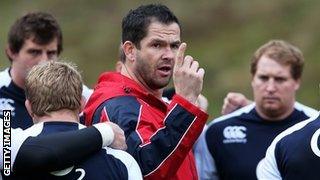
Much of Farrell's work takes place on the training pitch in the run-up to games
"Watching it from one position can only give you a partial view. Things that are happening in the breakdown - are we being aggressive enough? Are we going through? - are very hard to see from where we are. So we'll look at the real-time replays our video analysts sitting with us will pull up on their laptops.
"You have to understand why something has happened or hasn't happened, and you can rewind and have another look.
"How is the other team setting up defensively? Do you need to get a message to the players to counteract it? How is the backfield shaping up? Who is struggling fitness-wise for the opposition?"
Time to tweak
On the touchline stands the fourth member of the coaching team, Mike Catt, wired up to his colleagues up in the stand via short-wave radio.
GR: "We all have a mic, and we talk to Mike through his earpiece: 'Go and stand next to so and so, tell them this.'
"You are very conscious of being minimal. The players are knackered. They don't need a paragraph - they need bullet-points.
"I tend to give them too much. It's my big flaw. I want to go through every department of the game and help them."
SL: "When a coach is giving messages, sometimes it's just white noise. It's the coach trying to make himself feel better, ranting down the microphone.
"I try to be succinct unless something is genuinely required. I've been in all three positions: I've been the captain receiving messages, I've been the guy bringing the messages on, and I've been the message giver. When I was a captain, common-sense things being told to me from the sidelines used to irritate me, because I had enough things to worry about."
Onto the pitch
As soon as there is a break in play, Catt will dash on - taking a kicking tee, ferrying drinks, reading the players' emotions, passing on key messages.
Mike Catt, attack coach (MC): "Is there anxiety, panic or pure composure? Say Chris Ashton hasn't touched the ball for a while. I can run past him and say something to him.
Six Nations 2013 : Highlights: Ireland 6-12 England
"Make sure they are looking at you when you say it. You don't run past and just shout. You stop. 'Ashy. Look at me. Line-speed.' Just a nice little trigger.
"It has to be calm. There's no screaming and shouting. As a coach you want to take all the emotion out of a game, so you can think correctly. If you see a coach ranting and raving, they'll make the wrong decision.
"And those messages are strictly limited. Having played the game, us coaches know that the last thing you want as a player is message, message, message. If there's a point that one of the coaches up in the stands wants to pass on and I don't think it's relevant, I won't pass it on."
Half-time
Back into the dressing-room. The players have the first two minutes of the break to rest, pull on fresh shirts and rehydrate. Rowntree will then talk to the forwards, Catt to the backs, before the team comes together to listen to Lancaster and Farrell.
AF: "You have to keep it simple, and you have to be clear whether the player needs encouragement - because things haven't been going that well - or if they need a kick up the backside, because they think it's going well and you know it isn't.
"I might ask them how they're feeling, get their feedback first and then try to help them from there. 'Let's look at this…' Or, 'It's not as bad as you think - we're on top, the opposition's body language is terrible, there are holes here…' Get them into a good enough place that they can go out there and perform in the second half.
GR: "Sometimes they need a kick up the arse, but I can't be ranting and raving at them the whole time. If I haven't got another gear to go to, it will lose its threat. I want an environment where they are comfortable - comfortable to talk about ideas, about issues. And I will involve them as well.
"It's vital they rest. Drink. I remember as a player that, when you're nervous, you feel sick. You don't want to drink. So remind them.
"I've tried showing them video clips from the first half. That might work because pictures can show you more than words, but when they're looking at it, are they really taking it in?"
Second half trouble
With the match in the balance, the coaches watch how the team is coping. Are they taking control, or is the game going to slip away?
SL: "You can prepare a side as well as you can, but once they're on the field your influence is limited.
"The more you can give them responsibilities during the week, to problem-solve and deal with things themselves, the more likely they are to do it during the game. The more you spoon-feed them or hold their hand, the more likely they are to get lost."
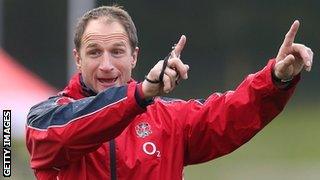
He'll have suggestions in training, but Catt wants the players to find their own solutions in matches
MC: "We want the players to come up with solutions themselves. I don't want to be the one coming on to give solutions.
"I want nine, 10 and 12 to ask, 'What's actually happening here?' To pull themselves out of their bubble and analyse - 'We've been defending for five minutes. We could run our next ball, but instead let's kick. Let's get it out of here, let's give ourselves some breathing space.'
"If your 13 is getting buried on the outside every time, because he's so narrow, the solution is to get a team-mate to come round the corner to cut off the runner.
"So he needs to shout, 'Oi! Get round the corner, because I'm getting mangled here!' Get the players to look at the big picture of where the game is going, and to take control."
Try-time
With a beautifully executed pre-planned move, England break the defensive line and go under the posts for the sort of score that coaches dream about. So how do they react?
MC: "I don't celebrate the tries. I never did as a player. There's an expectancy to score a try. We should be scoring tries.
"I'm all about, what is the next job? If Ashy scores in the corner, in the moment you know it's brilliant, but I'm out on the pitch straight away with a kicking tee, thinking, what am I going to tell Owen [Farrell], or what will I tell Geoff [Parling]?"
AF: "I'm thinking, kick-off - what do we need to do? Because so often you see a three points or five points being undone because of a lack of clarity on the next play [giving the opponents a chance to score].
"You've got to make sure that seven points stays seven points. Seven points then becomes 10. That's how you get away."
The opposition strike back
To wild celebrations from the away fans dotted around the stands, England's opponents smash through a tiring rearguard and bring the game level with a fine try and conversion of their own. What can the coaches up in the stands do? How powerless do they feel?
SL: "You don't have much control, but having done this for 20 years you get used to that feeling of helplessness.
"Everyone knows that if you lose the coach gets the blame, and if you win the players get the credit. That's the way it should be.
"Sometimes a referee's decision or the bounce of a ball can be an uncontrollable. But how are you going to deal with it? Your immediate thought is, what is going to happen next, and this is what we need to do next.
"You want the team's next move to be a positive action. And if you keep getting positive actions, you'll find yourself back in the game."
AF: "Stay in the moment. Sometimes a match can feel like it's going at the speed of light. And sometimes it feels 180 minutes long, never mind 80."
The key moment
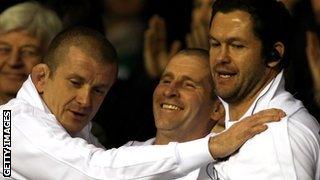
Timing is all when it comes to celebrations being caught on camera
With the seconds ticking away and the team's Six Nations season on the line, a drive from Rowntree's forwards carries England deep into enemy territory. Surge after surge takes them closer and closer - and then, to bedlam all around, they are over the line.
SL: "What the television audience sees us doing depends on when the camera pans to you. You might see me a split second after I've celebrated a try, and I've sat down to write something down.
"Generally I'm quite emotionally controlled. I'm always trying to think about what happens next. If we score, or do something fantastic, then I'm off my feet; if we do something that frustrates me, I can curse under my breath. I'm more aware now of being on public display."
GR: "I'm out of my seat. But it has to be in the context of the try. If it's the seventh try we score against Fiji, I'll probably sit down. But if it's the critical score in a key game, I'll be out of my seat."
The final whistle
Mentally and physically exhausted, limping and bleeding, the players slump back in the dressing-room. What do the coaches say?
AF: "You have to make sure you tell them exactly how it is. 'You could have lost by 10 points'. You can't make things up - 'you were brilliant'. Make sure the bull doesn't get in the way of the truth.
"Take the South Africa game in the autumn. You can't legislate for the try they scored. Pure luck. The rest of the game the lads did pretty well and were the better side, so that's what I told them."
MC: "The players can get caught up in the treadmill of matches. They don't get the chance to celebrate what they have achieved. I said to them after the New Zealand game: 'Take a step back tonight, or in the next few days, and reflect on what you've just achieved.'
"Too many times in your career you want to get on with the next thing. Enjoy the good times. Feel good about yourself. That's what sport is about."
Match-day evening
There are dinners to attend, interviews to give, players to congratulate and console. Then, at last, the coaches have a moment to themselves.
GR: "I start drinking. No, generally you're just knackered. You've been up and at it from 7am. I've learned to sleep on things after big matches."
AF: "I tend to want to get back to the hotel and watch the game again as soon as possible. It can be hard to remember accurately.
"The analysts download the entire match, filmed from four different angles, onto our laptops. I'm able to click on each whenever I want - let's see that moment wide, now let's watch it close up, now let's watch it from behind the posts. I watch it wide to see where the space is; I watch it tight to see where the detail is at the breakdown."
SL: "How well you sleep depends on the result and the performance. I need to get better at enjoying a win before my brain moves on to the next game or the next selection or the next opponents.
"By late evening - win, lose or draw - I'm already starting to move on to the match. That night I don't have rugby dreams. But I don't sleep for long."
- Published19 February 2013
- Published19 February 2013
- Published7 March 2012